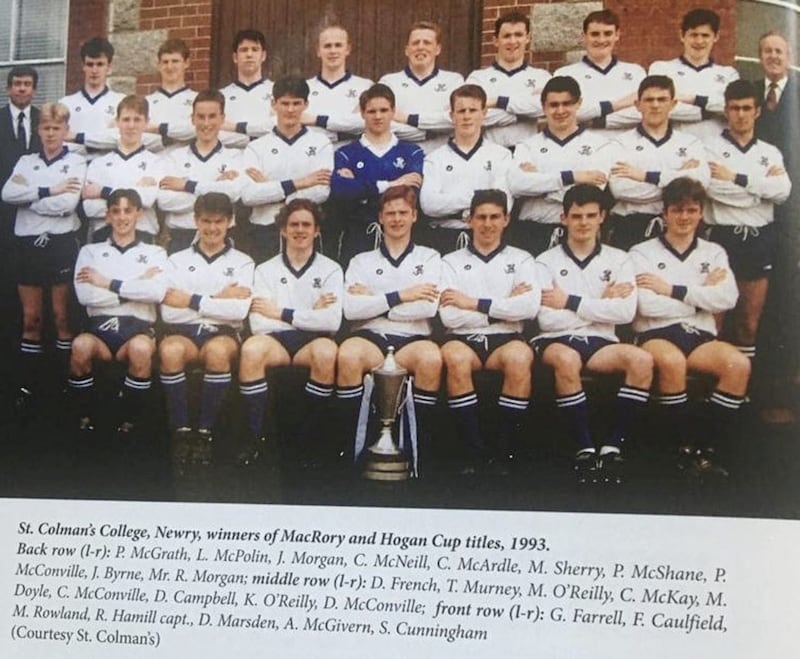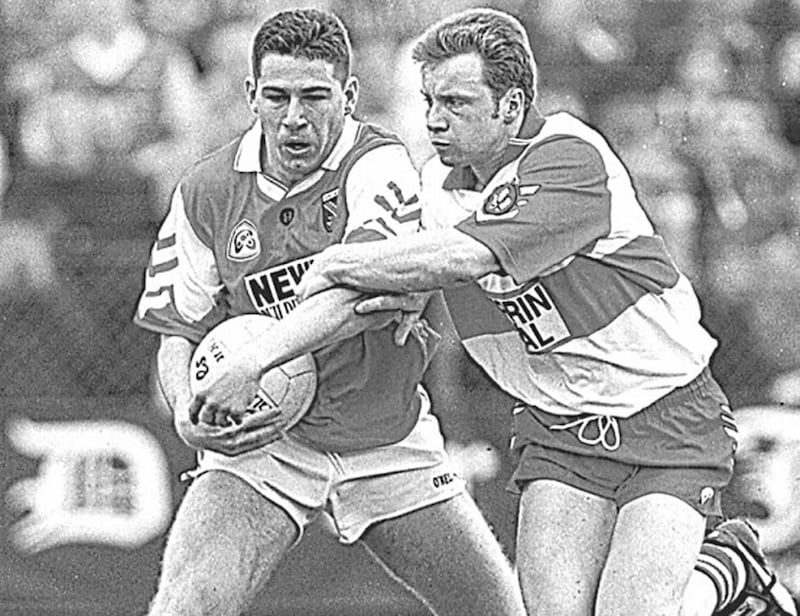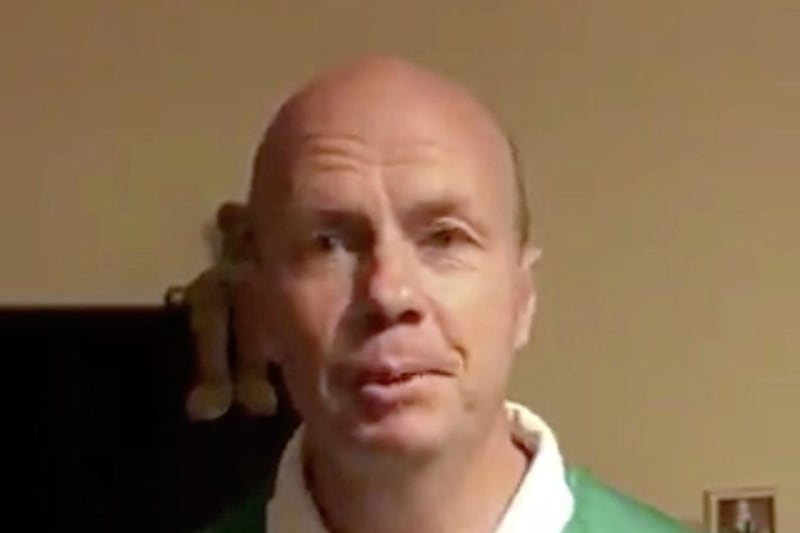In the first of a special two-part feature, Diarmaid Marsden delves into the memory bank and tells Brendan Crossan about his steady climb through the ranks that eventually led to Gaelic football's summit. Contributions from Aidan O'Rourke, Joe Kernan, Pete McGrath and Dessie Ryan...
DIARMAID Marsden – a ‘Noughties’ phenomenon: discuss. If you’ve read any of Aidan O’Rourke’s tactical analysis for RTE online, you will know he’s not predisposed to hyperbole. One of the most forensic minds in Gaelic Games, O’Rourke doesn’t know where to start with Marsden.
“When you talk about great players it’s hard not to fall into the realm of cliché,” O’Rourke says of his former Armagh team-mate.
“People will say: ‘Oh, he was the complete package.’ Diarmaid was genuinely the first guy I came across where I thought: ‘F***. I didn’t know it was possible to be that good.’
“For instance, I didn’t know it was possible to be as good off your weak side as off your strong side; just the balance he had, he could go left or right, you couldn’t close him down because you didn’t know which foot he was going to go on to, he was that good off either.
“Marsden had pace and power and aggression. Hands down, he was the best tackler in the Armagh squad, no question.
“If we played table-tennis he’d be the best table-tennis player. If we played tennis he’d be the best tennis player. Same with golf. Any sport, you pick it, Marsden was the best at it.”
In the late 1990s, early ‘Noughties’, Armagh were blessed with a clutch of top quality, game-winning forwards.
On any given day Stevie McDonnell, Oisin McConville, Ronan Clarke, John McEntee or Marsden would step up and be the difference in games.
As Marsden’s game evolved, he mightn’t have hogged the spotlight in the same way as Oisin or Stevie, which sometimes saw his contribution go unnoticed.
“I would say that’s probably true outside of Armagh,” O’Rourke says, “but within Armagh, supporters thought as highly of him as they did of Oisin or Stevie.
“If you talk to anybody in club football in the county, I’d say they would rank him number one. On different days, teams could probably double mark Stevie or they could get the right man to curtail Oisin.
“But there were days you could do nothing with Marsden. He was just a disaster to mark.”
The Clan na Gael clubman spent five years in total at Queen’s University – between 1994 to ’98 and returned to complete a Masters’ Degree in 2000 and won Sigerson, making up for the final defeat of ’94.
Marsden felt privileged to have been coached by the legendary Dessie Ryan to Sigerson glory in Galway 20 years ago.
But, for Ryan, the privilege was all his.
“Diarmaid was so quiet and unassuming, so ordinary and I mean ordinary in a really good way,” Ryan says.
“When he went on a football pitch, he was just magnificent, a different man, his demeanour. He was just the magic man on a football field.”
The casual observer probably didn’t quite get Marsden – not in the same the way team-mates or opponents did. Just how good he was and what he offered a team.
He could tackle and he could ride a tackle. He could score. He could play off either foot. He could win his own ball. He displayed an incredible appetite for the ugly sides of the game; chasing lost causes and forcing a million turnovers that made all the difference on so many big days.
Nobody understood inches quite like Marsden.
He could burn you for pace. And if you could match him stride for stride, his power would be decisive. If he had a weakness in his game, he kept it well hidden.
He was low maintenance too, a manager’s dream who never wasted energy on badgering referees.
He was selfless, athletic, whose game was doused in flair.
Psychologically speaking, Marsden seemed bullet-proof.
“Diarmaid could have played any sport,” Joe Kernan says. “He’d that physique about him... he was just a class act. You couldn’t say a bad thing about him. He didn’t antagonise anybody, he just got on with the game."
************
ST COLMAN’S, Newry still courses through Marcel Marsden’s veins. A boarder at the school during the 1950s, Diarmaid’s father won two MacRory Cups.
Marcel recently celebrated his 80th birthday.
Up until the pandemic struck, Marcel and his Colman’s buddies were still meeting up every six weeks in The Diamond, Warrenpoint.
When Diarmaid completed his 11-plus, it was already decided – primarily by Marcel – that his son would be going to his old alma mater.
‘But my mates are here (in Lurgan),’ Diarmaid protested.
“At the end of the day, you go, you get on a bus and you travel up and down to Newry for seven years,” Marsden says, “and I’m thankful for it because of the circle of friends I have through my football experiences there.”
In first year, Marsden won the Dalton Cup, but that’s all his year group would muster until his final year.
Mickey Doyle, now vice-principal, took Marsden’s year for the Corn na nOg and he continued to learn under the tutelage of Ray Morgan and Pete McGrath at Rannafast and MacRory Cup level.
“The whole St Colman’s experience was a great grounding for any Gaelic footballer,” Marsden insists.
“I read a piece about Greg Blaney recently and it brought so many memories back.
“You see the pictures on the wall in the corridors and it is so true – you want to get your picture on the wall. You’re looking at Greg Blaney, James McCartan, Jimmy Smyth…”

For Pete McGrath, the teenage Marsden was something of a slow burner of a footballer.
“As he was making his way through the various teams, not only Ray [Morgan] and myself, but the teachers directly looking after the teams always felt there was more in Diarmaid,” McGrath recalls.
“That he’s maybe not just giving us the product that he’s capable of. It was a case of Marsden? Aye, a great talent - but there’s more there, definitely more there.”
After St Colman’s edged out arch rivals St Patrick’s, Maghera after a replay in the 1988 MacRory final, the Newry students suffered back-to-back final defeats to the south Derry men in ’89 and ’90.
The following year – Marsden’s first taste of MacRory football – the college lost a third consecutive decider (to St Patrick’s Academy, Dungannon).
They reached the semi-final stages in ’92 before reclaiming the coveted silverware in 93, beating St Pat’s Maghera in the final, with Marsden the attacking hub of the Colman’s team.
In 92, Marsden was also cutting a dash with the Armagh minors that included club-mate and close friend Barry ‘Bumpy’ O’Hagan, Paul McGrane and Des Mackin.
That year the young Orchard men made it all the way to the All-Ireland final - but an injury-time goal from Michael Farrelly allowed Meath to steal the cup from under Armagh’s noses.
It was a devastating way to lose.
McGrath recalls: “I can remember the week after they lost the minor final as he was boarding in the college in his last year, and he was back in on maybe the Tuesday.
“I went to see him in his room and had a chat with him, just to talk about the match and commiserate.
“What struck me about him was he was disappointed but philosophical. Diarmaid had come to terms with the defeat pretty quickly and that was good for us going forward because the MacRory Cup campaign was starting shortly, the 92/93 campaign.”
The St Colman’s class of ’93 initially didn’t look or feel like a vintage group of players because they hadn’t won any major honours coming through the school.
They certainly had quality up the spine of the side – Ronan Hamill of Antrim was at full-back, Finbar Caulfield was wing-back and Mark Rowland at six, midfielder Charlie Pat McCartan was a hugely influential player, while Marsden pulled the strings at centre-forward.
The MacRory final was played in Coalisland and the hero of the hour was Aidan McGivern of Burren who grabbed a couple of stunning late points to edge out St Pat’s Maghera (0-10 to 1-5) who were backboned by Sean Marty Lockhart, Ronan Rocks and Colin McEldowney.
Hamill, one of the St Colman’s leaders, had an immense game at full-back while Charlie Pat McCartan – Wee James’ younger brother – was awesome at midfield and, of course, Marsden played a crucial role in the Newry college ending their five-year wait for the MacRory Cup, their 17th title overall.
By the time the Hogan Cup campaign kicked into gear, several of Morgan and McGrath’s players were over-age.
McGrath says: “Because of the age differential which existed then we lost a number of players going forward into the Hogan Cup and one player we lost was Charlie Pat McCartan who had a tremendous year.
“And Ray and myself were saying to each other: ‘Some of these boys are going to have to step up with Charlie Pat gone.’
“There were a couple of others as well but Charlie Pat would’ve been the stand-out man. He was marvellous in the final against Maghera.”
If Marsden was not fulfilling his potential in the early years at St Colman’s, he announced his arrival on the provincial and national stage in 1992 and 93.
They breezed past St Patrick’s Navan in the Hogan semi-finals before facing St Jarlath’s, Tuam in the decider at Pearse Park, Longford.
The Jarlath’s attack would take some holding with Galway stars of tomorrow Padraic Joyce and Michael Donnellan in their ranks.
Marsden, however, proved the match-winner with a sublime piece of skill and goal finish in the 43rd minute that saw St Colman’s cut St Jarlath’s lead to just one point.
Frank Roche of the Irish Independent described Marsden’s moment of brilliance.
“The Armagh minor star was confronted by a solid wall of Tuam defenders when he won possession. The danger seemed minimal, Marsden was in no mood to be stopped as his brute strength took him past several despairing tackles; his final shot then whizzed past Oliver Turner and straight through the net.”
St Colman’s went on to hit five points without reply to seal a MacRory and Hogan double, with 1-4 beside Marsden’s name at the final whistle.
“As far as I’m concerned Diarmaid Marsden came of age in that MacRory and Hogan series,” McGrath says matter-of-factly.
“In that final, Diarmaid Marsden really announced himself. He was physically strong and powerful but he was deceptive in the way he used it.
“He wasn’t one of those players who would be strutting or played with his chest out, but when he was going past a man or taking the ball through a ruck of players, the strength in his legs and the upper body… he had the same type of strength as Greg Blaney, an innate strength. He had a marvellous game that day.”
Later that summer, the Armagh minors crashed out of the Ulster Championship to Fermanagh in Irvinestown, and a week after that Marsden and some of his team-mates were behind the goal at The Athletic Grounds watching the Orchard seniors somehow battle back from 10 points down to edge out Fermanagh in a dramatic provincial replay.
“That was the day Denis Hollywood scored two goals with a couple of minutes to go,” says O’Rourke. “I think it was John Grimley who scored the last goal… and at the final whistle Des Mackin and Marsden jumped the fence to celebrate. A week later Marsden was drafted into the seniors.”
The young Clan nan Gael clubman quickly became one of the most important players to Armagh.
“Armagh played six matches in ’93 and never even made the Ulster final,” Marsden remembers. “But the standard in Ulster at that time was very, very good. So it took us a while as young fellas to find our feet.
“It probably took five years of hard graft and disappointment to win an Ulster [in ‘99].
“For a couple of years Armagh had two or three good forwards. You were looking at ‘Houly’ [Ger Houlahan] and Cathal O’Rourke, ‘Bumpy’ O’Hagan, and Oisin was coming on the scene.
“But to get six in the one forward line, and the introduction of Ronan Clarke, all were capable of winning their own ball and stepping up in the big games. Even if you look in reserve we had players who could come in and do a great job.”
In Monday’s Irish News…
“The ’99 Ulster final, I suppose, was a highlight in terms of an individual performance. Everything seemed to fall into place. It was our first Ulster since 1982. It was brilliant, it was absolutely brilliant. Of course, ’02 would eclipse it because of the magnitude of what we did. From a personal perspective, I’d a decent All-Ireland final, but it wasn’t at the level of the Ulster final of ’99” - In part two, Diarmaid Marsden recalls winning Ulster for the first time, getting his hands on Sigerson, climbing the steps of Hogan and coming out of retirement in ’07 for one last throw of the dice with Armagh







